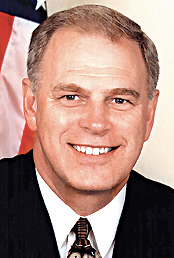Strickland’s approval ratings decrease slightly
Ohioans aren’t sold on the governor’s proposals on the economy, gambling and
education.

Ohio Governor Ted Strickland (D-Lisbon)
By MARK KOVAC
VINDICATOR CORRESPONDENT
COLUMBUS — Ohioans aren’t keen on Gov. Ted Strickland’s $1.7 billion bonds for jobs stimulus package or other proposals unveiled during this month’s State of the State speech, according to a poll released Tuesday.
Strickland’s approval rating also dipped in the Quinnipiac University Polling Institute’s survey of 1,853 registered Ohio voters.
A total of 54 percent approved of the way the governor was handling his job, versus 19 percent who disapproved and 25 percent who did not answer or did not know. That’s the lowest it’s been since May 2007, when 54 percent approved and 16 percent disapproved.
“Gov. Strickland remains highly thought of by most Ohio voters, but his numbers are ticking down slightly,” said Peter Brown, assistant director of the institute. “Although he remains personally popular, that good will Ohioans feel toward him is not matched by their views of his proposals on the economy, gambling and education.”
The Connecticut-based university regularly conducts polls in Ohio, Florida, Pennsylvania, New York, New Jersey and its home state, gauging voter opinions on candidates and issues.
On initiatives unveiled by Strickland during his State of the State address:
UForty-four percent of those polled said “borrowing $1.7 billion to create jobs in Ohio” is a “bad idea,” while 40 percent thought it was a “good idea.”
Forty-four percent also said the idea was “not too likely “ or “not likely at all” to succeed in creating a projected 80,000 jobs. “Voters are skeptical he can do what he proposes when it comes to job creation and are uncomfortable with that much borrowing at a time when the state already has financial problems,” Brown said.
UForty-nine percent of voters opposed an expansion of legalized gambling in Ohio, via electronic Keno machines in bars. A total of 44 percent supported the lottery expansion.
USeventy percent of voters prefer the existing state education governance structure rather than the governor’s proposal to create a Cabinet-level position to oversee it.
 43
43
